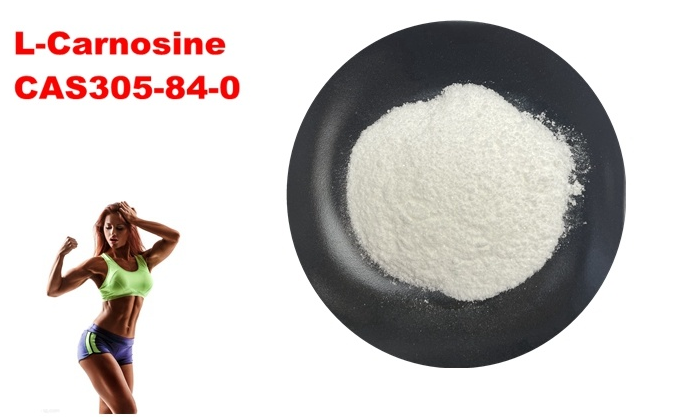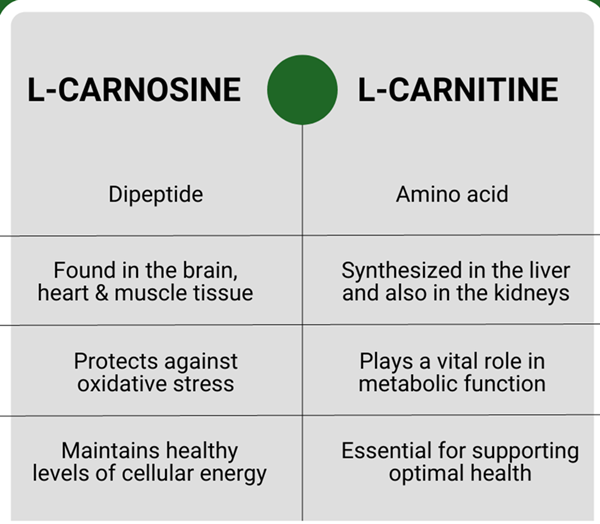L-Carnosine and L-Carnitine are two different compounds that are often confused due to similar names. While both have potential health benefits, it’s important to understand the differences between the two and how they support different aspects of health and well-being.
Learn about L-Carnosine:Cell Protector
L-Carnosine Powder is a dipeptide composed of the amino acids beta-alanine and histidine, known for its antioxidant properties and ability to protect cells from oxidative damage. It plays a vital role in neutralizing free radicals and supporting overall cellular health. L-Carnosine has been studied for its potential benefits on brain health, muscle performance, anti-aging effects, and skin health, making it a versatile and valuable supplement for individuals seeking to support overall health.
Discover L-Carnitine: The Energy Transporter
L-carnitine, on the other hand, is an amino acid derivative that plays a key role in energy production. It is involved in transporting fatty acids to mitochondria where they are converted into energy. L-carnitine is known for its potential benefits on energy metabolism, athletic performance, cardiovascular health, and weight management. By supporting fat’s efficient use of energy, L-carnitine offers advantages to individuals looking to improve physical performance and overall energy levels.
The difference between the two
While both L-carnosine and L-carnitine have health benefits, it’s important to understand their unique mechanisms of action and the specific aspects of health they support. L-carnosine focuses on cell protection, antioxidant support and overall health maintenance, while L-carnitine is more closely related to energy metabolism, physical function and cardiovascular health. By recognizing the unique effects of each compound, individuals can make informed decisions about which supplements meet their health goals and needs.
- Chemical structure: L-Carnosine( β- Alanyl L histidine is composed of β- A dipeptide composed of two amino acids, alanine and histidine. L-Carnitine (3-hydroxy-4-methyl-L-citrulline) is a non protein amino acid composed of three amino acid methyl groups.
- Molecular function: L-Carnosine has multiple functions in the body, including antioxidant, anti glycation, anti-inflammatory, and anti-aging. It can neutralize free radicals, protect cell structure, promote cell repair, and delay the aging process. On the other hand, L-Carnitine mainly plays a role in transporting fatty acids in the body. It participates in the transport and metabolism of fatty acids in mitochondria, promotes the oxidative decoupling reaction of fatty acids, and thus generates energy.
- Existence location: L Carnosine powder mainly exists in muscle tissue, nerve tissue, and brain tissue, especially in skeletal muscle, with the highest content. L-Carnitine mainly exists in tissues such as the liver, muscles, and heart.
- Source and intake: L-Carnosine can be consumed through food sources such as meat and fish. The human body can also produce L-Carnosine through synthesis. L-Carnitine can be consumed through food sources such as red meat, dairy products, and fish, as well as synthesized by the liver and kidneys.
- Supplementary use: Due to its antioxidant and anti-aging properties, L-Carnosine is widely used in anti-aging, skin care, and health supplements. L-Carnitine, on the other hand, is often used as a performance enhancer, weight loss agent, and cardiovascular support agent to provide energy and promote fat metabolism.
Choose a supplement that suits your needs
When considering taking L-carnosine food grade and L-carnitine supplements, it is important to evaluate your personal health goals and determine which benefits are most relevant to you. If you’re looking to support cellular health, antioxidant protection, brain function, muscle performance, anti-aging effects, or skin health, L-carnosine may be ideal for you. On the other hand, if you are focused on enhancing energy metabolism, athletic performance, cardiovascular health, or weight management, L-carnitine may be a better fit for your needs.
Xi’an tgybio Biotech Co.,Ltd is L-carnosine and L-carnitine powder supplier, We can provide both of these products and also offer customized services for you. You can choose the appropriate product according to your needs. If you have any other questions about these two products, please feel free to inquire. I have a professional team that provides consulting services for you and can also help you solve after-sales problems. If you need any other products, you can browse our website, our webiste is https://tgybio.goodao.net/. If you are interested, you can send e-mail to rebecca@tgybio.com or WhatsAPP +86 18802962783.
In conclusion
In summary, while L-carnosine and L-carnitine have some similarities in name, they are different compounds with different mechanisms of action and health benefits. By understanding the differences between the two and recognizing their unique roles in supporting health and well-being, individuals can make informed decisions about which supplement is best for their needs. Whether you’re looking for cell protection, antioxidant support, brain health, muscle performance, anti-aging benefits or skin nourishment, L-Carnosine may be the right choice for you. Conversely, if you are concerned about energy metabolism, physical performance, cardiovascular health, or weight management, L-carnitine may be the supplement that fits your health goals. With a clear understanding of the differences and benefits of L-carnosine and L-carnitine, individuals can confidently choose the supplement that best supports their overall health and vitality.
Reference:
Bendz, H., & Hulthe, J. (2018). “The Role of Carnosine in Muscle Function and Aging.” Journal of Aging Research, 2018.
Krebs, H. A. (2000). “Carnitine and its Role in Fatty Acid Metabolism.” Biochemical Journal, 2000.
Hipkiss, A. R. (2010). “Carnosine: A Protective Role in Aging and Disease.” Aging Cell, 2010.
Baker, R. M., & Houghton, P. J. (2015). “The Role of L-Carnitine in Exercise Performance.” Sports Medicine, 2015.
Zhang, Y., & Wang, Y. (2019). “Comparative Study of Carnosine and Carnitine: Similarities and Differences.” Journal of Nutritional Biochemistry, 2019.
Post time: Mar-12-2024











